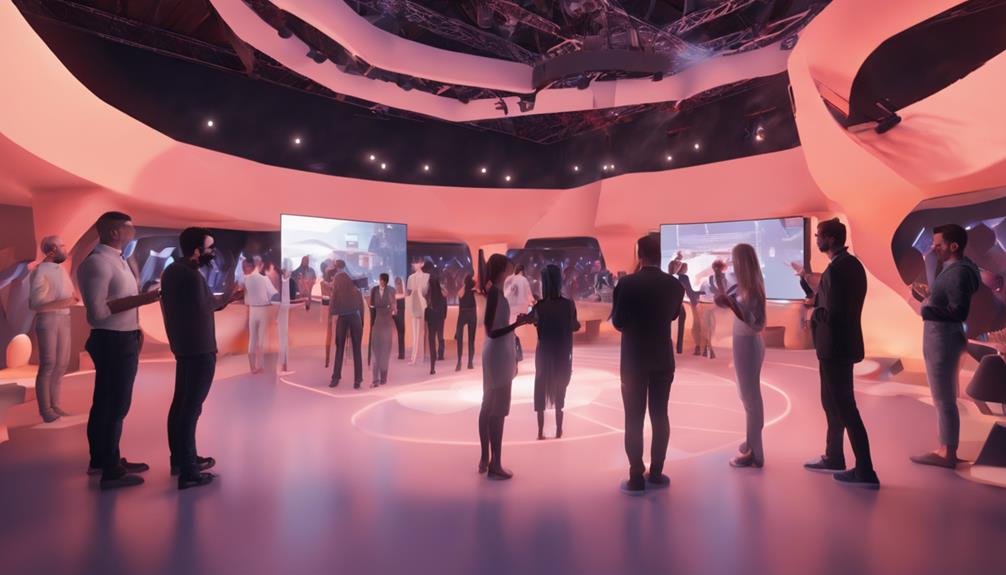The Future of Event Marketing: Virtual and Hybrid Solutions
Event marketing is being transformed by virtual and hybrid solutions, offering immersive and interactive experiences. Brands are embracing virtual reality, gamification, and advanced analytics for impactful events. Benefits include broadening reach, fostering connections, and creating dynamic fusion. Audience engagement thrives through tailored content, gamified activities, and interactive elements. Incorporating virtual networking and personalized experiences enhances attendee satisfaction. The future of event marketing lies in the innovative integration of virtual and hybrid solutions, revolutionizing how brands engage with audiences. Stay ahead of trends and discover the endless possibilities for engaging event experiences.
Key Takeaways
- Leveraging virtual reality for immersive experiences
- Blending in virtual and in-person elements for broader reach
- Enhancing engagement with interactive content and gamification
- Customizing experiences for personalized attendee interactions
- Facilitating virtual networking opportunities for meaningful connections
Evolution of Event Marketing
Over the past decade, the landscape of event marketing has undergone a profound transformation, propelled by technological advancements and shifting consumer preferences. One of the key elements driving this evolution is the increasing focus on interactive experiences and virtual reality integration. Event marketers are now leveraging these tools to create immersive and engaging experiences for attendees.
Interactive experiences have become a cornerstone of successful event marketing strategies. By allowing participants to actively engage with the event content, brands can create memorable moments that foster deeper connections and drive brand loyalty. Incorporating elements such as gamification, live polls, and interactive displays can greatly enhance the overall event experience and leave a lasting impression on attendees.
Moreover, virtual reality integration has revolutionized the way events are conducted. Through VR technology, event organizers can transport attendees to virtual environments, enabling them to explore products, participate in interactive demos, and engage with brand messaging in a completely immersive way. This level of immersion not only captivates audiences but also provides a unique and innovative platform for brands to showcase their offerings.
Benefits of Virtual Events
As event marketing continues to evolve, the shift towards virtual events brings forth a myriad of benefits that redefine audience engagement and brand interaction. One of the key advantages of virtual events is the opportunity for virtual networking. Attendees can connect with each other from anywhere in the world, breaking down geographical barriers and facilitating meaningful interactions. Through chat functions, breakout rooms, and virtual meetups, participants can engage in conversations and establish valuable connections, enhancing the overall event experience.
Moreover, virtual events offer interactive experiences that captivate audiences in unique ways. From virtual reality simulations to gamified activities, attendees can actively participate in the event, making it more memorable and engaging. Interactive elements such as live polls, Q&A sessions, and virtual workshops create a dynamic environment where participants feel involved and invested in the content being presented.
Advantages of Hybrid Solutions
Hybrid solutions offer event organizers the ability to expand their reach beyond physical limitations, tapping into a global audience.
By combining in-person and virtual elements, hybrid events provide a unique opportunity for increased attendee engagement through interactive features and diverse content delivery methods.
The advantages of hybrid solutions lie in their capacity to blend the best of both worlds, fostering a dynamic and inclusive event experience for participants.
Increased Reach
With the integration of virtual elements, hybrid event solutions offer a dynamic platform that extends the reach of traditional in-person events to a global audience. This global expansion is facilitated by the ability to connect with attendees from different parts of the world, breaking down geographical barriers.
Through digital engagement tools such as live streaming, interactive chat features, and virtual exhibition spaces, hybrid events create opportunities for participants to interact and network in real-time regardless of their location. This increased reach not only broadens the event's impact but also allows for a more diverse audience to participate, resulting in enriched discussions and knowledge exchange on a global scale.
Hybrid solutions truly revolutionize event marketing by maximizing reach and fostering meaningful connections beyond physical boundaries.
Enhanced Engagement
Revolutionizing the landscape of event engagement, hybrid solutions offer a dynamic fusion of virtual and in-person elements that captivate participants with immersive interactive experiences. These solutions introduce a new domain of possibilities for event marketers to enhance engagement through:
- Virtual Networking: Facilitating connections beyond physical boundaries, allowing attendees to interact with a diverse range of participants.
- Gamification: Incorporating interactive activities like quizzes, polls, and challenges to keep attendees engaged and entertained.
- Personalized Experiences: Tailoring content and activities to individual preferences, creating a more meaningful and memorable event for each participant.
Technology Trends in Event Marketing
As event marketing continues to evolve, technology plays a pivotal role in shaping the landscape. Virtual event platforms offer interactive and immersive experiences for attendees, while augmented reality brings a new dimension to event engagement.
Embracing these technology trends can enhance the overall impact and effectiveness of event marketing strategies.
Virtual Event Platforms
In the ever-evolving landscape of event marketing, virtual event platforms have emerged as indispensable tools for creating immersive and engaging experiences for audiences worldwide. These platforms offer a range of interactive features and opportunities for custom branding, enhancing the overall event experience.
Some key aspects of virtual event platforms include:
- Interactive Features: Virtual event platforms provide interactive tools such as live polls, Q&A sessions, and networking lounges to keep attendees engaged.
- Custom Branding: Organizers can tailor the platform to reflect the branding and messaging of the event, creating a cohesive and branded experience for participants.
- Analytics: These platforms often offer robust analytics capabilities, allowing organizers to track attendee engagement and gather valuable insights for future events.
Augmented Reality Experiences
Augmented reality experiences are reshaping the landscape of event marketing by seamlessly blending digital elements with the physical world, offering attendees a truly immersive and interactive engagement. These interactive activations transport participants into mesmerizing virtual worlds where they can engage with products, services, and brand messaging in innovative ways.
By creating immersive environments that blur the line between reality and digital content, event marketers can captivate audiences and leave a lasting impression. Augmented reality experiences not only enhance the overall event experience but also provide valuable data and insights into attendee behavior and preferences.
Incorporating these cutting-edge technologies into event marketing strategies can set brands apart, driving higher engagement and creating memorable experiences for participants.
Enhancing Audience Engagement
Elevating audience engagement through interactive experiences has become a pivotal strategy in modern event marketing. To captivate attendees and create memorable experiences, event organizers are implementing innovative tactics that go beyond traditional methods.
Here are three key ways to enhance audience engagement:
- Interactive Activities: Incorporating interactive elements such as live polls, quizzes, or virtual scavenger hunts can keep attendees actively involved and invested in the event.
- Personalized Content: Tailoring content based on attendee preferences and behaviors can create a more personalized experience, increasing engagement and fostering a deeper connection with the audience.
- Gamification: Introducing gamification elements like leaderboards, challenges, or rewards can add a competitive edge to the event, driving participation and engagement levels.
Strategies for Success in Virtual Events
To excel in virtual events, organizers must harness cutting-edge technologies and strategic planning to create immersive and impactful experiences for attendees. Incorporating interactive content and gamification can greatly enhance engagement levels. By offering interactive sessions, polls, quizzes, and challenges, attendees are actively involved in the event, leading to a more memorable experience.
Another vital aspect is virtual networking. Providing attendees with virtual networking opportunities through one-on-one video chats, group discussions, or virtual lounges can simulate the in-person networking experience. Personalization is also essential in virtual events. Tailoring content based on attendees' preferences and behavior can make the event more relevant and engaging for each participant.
Below is a table highlighting key strategies for success in virtual events:
| Strategies | Description |
|---|---|
| Interactive Content | Engage attendees through interactive sessions, polls, quizzes, and challenges. |
| Gamification | Incorporate game-like elements to make the event more fun and engaging. |
| Virtual Networking | Facilitate networking opportunities through one-on-one video chats and group discussions. |
| Personalization | Tailor content based on attendees' preferences and behavior for a more relevant experience. |
Conclusion
To sum up, the future of event marketing is shifting towards virtual and hybrid solutions, providing a mix of convenience and engagement for audiences.
As technology continues to progress, event marketers must adjust to meet the changing needs of their target demographics.
By embracing these creative approaches, they can create a vivid portrayal of immersive experiences that captivate and resonate with attendees, ensuring the success of their events in the digital age.







